#are there poor disabled queer immigrant elders?
Text
you cannot uncouple "it's rich white people doing it not old people" from the fact that being a Rich White People makes it significantly more likely that you will get old in the first place
#are there poor disabled queer immigrant elders?#duh?!#but you can't post about 'the progressive ones died :('#'the oppressed ones died :('#then turn around 5 seconds later and act like older generations are NOT disproportionately white rich and conservative#unfortunately this means enshrining rights for the oldest among us#means protecting a disproportionally large number of people determined to strip everyone else's away#which is a problem with no solution anybody is going to like but it isn't unreasonable to be annoyed about it actually
95 notes
·
View notes
Text
Asians 4 Black Lives: Structural Racism is the Pandemic, Interdependence and Solidarity is the Cure
The COVID-19 pandemic has driven a new surge in violence against Asian communities across the world. Several high-profile instances of anti-Asian racist violence—spurred on by casually racist remarks at every level of government, business, and popular culture—have created a terrorizing climate for many. In San Francisco Chinatown for example, overt xenophobia, combined with the economic impact of shelter-in-place orders, has left immigrants, elders, limited English-speaking people, and poor folks feeling like targets. In San Francisco, where a staggeringly disproportionate 50% of the COVID-19 mortalities are from the Asian and Pacific Islander community, the pandemic has ushered in multiple violences. This has been further exacerbated by pre-existing crises: gentrification, displacement, homelessness, police terror, inequities in education, a drastic uptick in deportations, antagonism against trans and queer people, poverty, and exploitation.
Nationally, Black people are dying from COVID-19 at rates twice as high as other groups, an outcome of deeply embedded structural racism in healthcare, housing, labor, and other policies. Communities are weakened from decades of housing discrimination and redlining, forced denser housing, targeted criminalization and incarceration, larger numbers of pre-existing health conditions, and less access to affordable healthy food. Black communities are more likely to live in places with air pollution, rely on public transit, and be essential workers, so exposure rates increase. When Black people fall ill with COVID-19, racism in the healthcare system means lack of access to quality care, testing kits, or funds for treatment. In some cases, like for Zoe Mungin, they are simply not believed and turned away from treatment, until it is too late.
We must recognize that the scapegoating of Asians as the harbingers of disease and the state violence against Black people (via systemic policing and state response to the pandemic) are two sides of the same coin. This system of oppression is what indicates whether we live or die. This moment makes it even clearer that we must radicalize our communities for cross-racial solidarity.
Asians and Anti-Blackness in the US
Asians in the US are not a monolith. Some of us are first-generation immigrants who came here to work under selective immigration policies that privileged our education and technical skills. Some of us are here through involuntary migrations—fleeing economic and military wars waged in our homelands by the US and other imperial powers. Some of our Asian families have been in the US for generations. Some of us were adopted from Asian countries by non-Asian families. Some of us are mixed-race and of Black and Asian descent. We cannot ignore the varied experiences and distinctions between how our people got to this land, our familial and community histories in the US, and the way in which mainstream American perceptions and portrayals impact us differently. What we do have in common is that we’re incentivized by capitalism and racism, particularly anti-Blackness, to hold up the dual evils of white supremacy and American imperialism.
In order to fight back, we need to be more informed. That means understanding how we’ve been asked to buy into this system and to uphold ideas, policies, and practices that ultimately go against our interests. That also means being active and vocal supporters of Black liberation, and taking responsibility to end our anti-Blackness. We must acknowledge that anti-Blackness is at the core of all racism and that non-Black Asians have benefited—conditionally—from a system of anti-Blackness politically, economically, and socially. See our statement on recent police killings of Black people for more on this. It also means understanding how the history of racial capitalism has impacted all our communities and continues to impact us.
A Shared History of White Supremacy and Imperialism
Today the current administration is seeding a second Cold War with China to protect its financial interests globally and in the Asian Pacific. Stateside, we see results of this expressed as public figures repeatedly call COVID-19 a “Chinese virus” or a “Kung Flu,” directly resulting in vigilante attacks on people of Chinese descent, or people perceived to be of Chinese descent. In the summer, we’re seeing an uptick in COVID-19 cases as states push for “re-opening,” in part so that the state doesn't have to pay the brunt of unemployment benefits. This puts frontline workers (who are disproportionately from communities of color) at further risk—a decision not made off science but because of the drive for profit. In 2014-15, the Ebola outbreak also became a racialized pandemic, sparking widespread fear of African countries and a globalized anti-Blackness by Western countries.
We’ve seen this before: racist rhetoric, scapegoating, and, eventually, military tactics that target and intimidate communities of color to reinforce US capitalist priorities domestically and imperialism abroad. During World War II, fear of military threat by the Japanese government and fear of the economic influence of people of Japanese descent in the US led to the racist mass incarceration of Japanese Americans. Despite this despicable history, racist pundits have recently claimed the incarceration of Japanese Americans actually sets legal precedent for the targeting of other communities of color in the post 9-11 era. US government officials used Southwest Asian, North African, Muslim and South Asian communities as scapegoats during the “War on Terror” which put a huge target on their backs for vigilante violence, created massive surveillance and state-sanctioned harassment programs, and provided a cover for starting endless wars in the Gulf and West Asia for geopolitical dominance. During the rhetoric leading up to the various iterations of Trump’s travel bans we saw xenophobic language like “shithole countries” targeting both Muslim and African countries. We know that within the system of immigration surveillance and detention, Black immigrants are disproportionately targeted and deported.
We also know that the modern US police force was created in the antebellum period as patrols to hunt down people escaping slavery. Their present-day incarnation has been further solidified through continued targeting of Black communities as well as cracking down on unions and workers fighting for fairer wages and decent working conditions. Similarly, prisons are the contemporary progenies of slave plantations. These systems are undergirded by a dominant white supremacist narrative that insinuates Black people are inherently criminal and Black communities and families are irreparably broken. These narratives—built on more than 500 years of slavery, Indigenous genocide, and the theft of Native land—protect white owning-class privilege and power while resulting in death, disempowerment, and suffering, which disproportionately impact Black and Indigenous communities. These dominant systems, and the narratives that support them, have a firm grip on every aspect of contemporary US life. Understanding these critical connections is required political education for all—a more strategic resistance enables growth and strength across multiple communities of struggle. Without this, our communities are more vulnerable to counterproductive responses.
Moving Away from Counterproductive Responses
Unfortunately, in response to the rise in anti-Asian violence during COVID-19, we’ve seen vigilante groups form, bent on taking matters into their own hands. These responses reinforce the violent systems and narratives we want to dismantle. One such group that we’ve learned about in San Francisco Chinatown is composed of some ex-military. They have claimed they would perform citizens’ arrests, and have surveilled people they deem “suspicious,” and called the cops on them. Based on historic biases of the police and military, the folks targeted by this vigilante group have been Black, poor, unhoused, disabled, or a combination of the above. As we’ve seen for decades, police kill Black people at rates six times that of white people. This group has even co-opted language from the movement for Black lives in order to seem more sympathetic. Utilizing policing tactics like “patrols” and engaging in military-style surveillance and harassment of Black and poor people is an escalation and expansion of violence—not successful harm-prevention.
In this moment of the pandemic and uprisings, there is an opportunity to pivot to the future our communities want and need. Rather than attempting to solve the issues we’re facing by using tactics that replicate harm, we ask ourselves and each other: What new systems of support and care can we build and grow so that the world can be better? Asians cannot afford to hold on to the meager protections given to us by white supremacy; we can no longer be conscripted to fight the battles of white supremacy and American imperialism on its behalf while simultaneously being harmed by these systems. We need to recognize that our liberation is tied to our interdependence and solidarity.
Our Liberation is Intertwined
Hyejin Shim, queer Korean and prison abolitionist, poses an essential question: “What are the legacies we’ve inherited, which ones will we choose to protect?” In her piece questioning the limits of Asian American allyship, Hyejin reminds us that as Asian Americans, we have a rich, deep legacy of “Asian American prison abolitionists, anti-war activists, racial justice organizers, disability justice freedom fighters, queer/trans feminists & anti fascists, immigrant rights organizers, housing justice organizers, rape and domestic violence survivor advocates, labor organizers, artists and cultural workers, movement lawyers, and so many more, from both the past & present.” In all of these movements, Asian Americans have struggled alongside their Black siblings, with an understanding that our liberations are intertwined.
Again, Black and Asian solidarity in the face of systemic oppression is not new and we should continue to draw lessons from our vibrant shared history to inform our current and future work organizing for a more just society.
Early 1900s: Black US troops desert to join Pilipino independence fighters.
1969: Black, Asian, and Latinx students at San Francisco State University successfully lead a strike to create the first-ever Ethnic Studies program.
1970s: The Black Panther Party supports Pilipino residents of the International Hotel in their fight against eviction.
2006: After Hurricane Katrina, Black and Vietnamese communities in New Orleans protest the use of their community as a makeshift dump site.
2020: Black and Asian communities in New York lead a movement to Cancel Rent, focused on immigrant, undocumented, and homeless communities.
(For more on the above examples, check out these zines by Bianca Mabute-Louie!)
Grounding in Interdependence and Solidarity
In addition to deepening our understanding of our shared histories, we should deepen our interpersonal relationships—our trust. We should continue to build out the mechanisms through which we tangibly support each other. As Stacey Park Milbern—a dearly beloved queer mixed race Korean comrade and disability justice movement leader who recently passed away—taught us: “We live and love interdependently. We know no person is an island, we need one another to live.”
This month, hundreds of thousands of people flooded the streets, decrying the police murders of George Floyd, Breonna Taylor, and so many more. The people are mobilizing to uplift calls from Black organizers to defund the police while imagining and implementing alternatives to policing that actually promote community health and wellbeing. It’s a beautiful sight to behold and we must not forget that this incredible and rapid mass mobilization is a direct result of the tireless and intentional work of organizers who move in between these flashpoint moments: people who do the unsung work of cultivating and deepening interpersonal relationships over decades, holding difficult and educational conversations, supporting members through personal challenges, and creating venues for community to celebrate victories and accomplishments.
Deep, intentional relationship building is central to laying the foundations that make change possible; at the same time, it is not just a means to an end. Trust and interdependence are ends in themselves. As Asians 4 Black Lives, we aim to live out the world we are fighting for, and our deep comradeship and friendship is core to how and why we show up. For example, we have taken up the practice of beginning each of our regular meetings with personal check-ins: Do you have any needs that our community can help you with? Do you have any resources or bandwidth you can offer to community? We are often wrestling with the complexity of what it means to be people of Asian diaspora living in the United States and in joint struggle with our Black, Indigenous, and other comrades of color. This extends our questioning into deeper political territory: What, if any, is our role as US-based Asians in addressing anti-Blackness in Asian communities abroad? What does it mean to be called #Asians4BlackLives when that phrase is being used as a rallying cry for so many who express their solidarity in ways we may not be aligned with? Our work raises important questions that help us sharpen our analysis and build stronger ties with each other and the communities we are accountable to.
Whatever the world throws at us, be it interpersonal violence, a novel coronavirus, climate change, or vigilante racism, we know that communities are most resilient when basic needs are met. As others have noted, wealthy, predominantly white communities have much lower rates of policing and longer life expectancies than lower income communities of color. This isn’t because rich people or white people are less predisposed to do harm, or because they are physically or biologically predetermined to be healthier, but rather that these communities are allocated more resources and support structures. These communities are given more chances to address violence without being criminalized, but this often empowers people with privilege to continue causing harm without facing consequences. Instead of this model, we strive for a world where everyone’s needs are met and new systems help us address real issues of health and harm without relying on the carceral state.
The good news is we’re seeing more and more Asian communities move towards redistributing resources of time, money, and energy in this moment. Asian volunteers are phonebanking and getting donations pledged to Black groups—directly. Asians are encouraging each other to speak to their families and communities. Asians are supporting the campaigns and creative direct action efforts of Black-led groups to win the defunding and abolition of police and prisons. Asians are setting up strong alternatives to relying on these systems for safety. It is a powerful moment of mobilization.
As COVID-19 shifts social relations in unprecedented ways and oppressive forces leverage the pandemic to stir up fear and anti-Asian racism for their own benefit, we must resist the temptation to put up walls and isolate ourselves. It’s essential that we be resilient and creative in the ways we stay close. Let us continue to deepen our trust and ground ourselves in our rich legacies of solidarity. Let us leverage our collectivizing strength as we fight for a world that centers humanity, dignity, and the space to thrive.
#Asians4BlackLives#AsiansforBlackLives#BlackLivesMatter#BlackHealthMatters#Pandemic#Solidarity#Public Health#Health#COVID-19#COVID19#Coronavirus#Racism#Interdependence#Asians for Black Lives#Black Lives Matter
11 notes
·
View notes
Text
Sara Ramirez receives Trailblazer Award (Speech Transcript)
This is a beautiful recognition and it means the world. Robyn Ochs, Faith Cheltenham, thank you from the bottom of my heart, for all that you’ve done to center the bisexual+ community and our histories, our needs and our beautiful stories. No trailblazer can trail blaze without standing on the shoulders of others who fought for our visibility. I thank you and all of the hardworking bisexual+ community leaders and activists and allies for empowering me to stand here before you tonight to receive this honor. At the same time, I must name the painful reality that while I am being honored for who I am and what I’ve done there’s so many LGBTQ institutions and spaces where I don’t feel safe, where I don’t feel recognized as a bisexual, pansexual, queer person of color. While my platform has given me important access, I am so blessed to have the many privileges that I do. Every time bisexual+ people are erased, every time I am erased, as a bisexual+, queer person of color in the movement spaces that are supposed to be my home, the pain can feel unbearable. If I’m going to be recognized, you must also recognize my community’s vulnerabilities and needs. Whether you are comfortable with labels or not, the fact is, the ability to be seen, to name our truth, to find community and build power around who we are is such a critical part of any political movement for true liberation.
Recently, at a conference focused on ending youth homelessness I had an experience that exemplifies this type of pain. I was in attendance as a representative of the board of directors for the organization hosting the event as well as to listen and learn. After one panel, I was sitting at a table when I was approached by a white gay identified woman who eagerly wanted to get a picture with me for her wife, I told her I wasn’t doing pictures at that time, we then talked. We started talking about the gay rights and gay pride work that she does and I am a curious person, so I asked questions, including questions about how people of color and bisexual+ people were integrated into the work, she seemed uncomfortable, after some more awkward exchanges, the conversation ended naturally and we went our separate ways. Hours later, the same woman tracked me down to say “I didn’t have my glasses on earlier, but now I do and you’re not who I thought you were.” And with that she walked away. “You’re not who I thought you were.” “You’re not who I thought you were.” I remembered those words so clearly, because this exchange is a microcosm of how I often feel as a bisexual, pansexual, queer woman of color in LGBTQ spaces. I am desired until I am inconvenient; I am useful until I am disruptive. This is the experience not just of celebrities or others with platforms but the entire bisexual, pansexual, fluid, non-monosexual, queer identified community, especially those of us whose lives intersect with multiple margins. Those of us who are immigrants, poor, brown, black, disabled, asylum seekers and bisexual, pansexual, fluid, queer, trans and or non-binary. When I thought about what to say here tonight, I considered asking folks in this room who identify as bisexual, pansexual, fluid or non-monosexual to identify themselves, so we could see one another, celebrate one another and maybe feel less alone. But the anticipation of almost no one standing up with me because so many of us don’t feel safe to, can’t, was too painful for me to risk. I have felt so vulnerable, so often.
No matter where I turn, there’s so few resources specifically for bisexual+ people generally, and especially bisexual+ people of color. We are suffering because we don’t have a community, we’re fractured, we’re isolated and this experience of not being seen or recognized or of being out right excluded with hostility, takes a toll. It’s part of why we see such negative health outcomes for bisexual+ people, it is being reported by the CDC that bisexual, pansexual, fluid individuals have the highest rates of suicidality and depression among our lgbtq community and the most recent study published in 2016 by [Heron Greenesmith BiNet USA, Bisexual Organizing Project, Bisexual Resource Center and MAP(Movement Advancement Project)] it is being documented yet again that over 50% of the lgbtq+ community identifies as bisexual, fluid, non-monosexual and yet we are often neglected and erased. There is rarely programming specific to our needs, rarely speakers, trainers and staff for bi+ and can lead bi+ specific work. But it is time for that to change. For us to see bi+ staff at large in LGBTQ institutions, to see brown and black bisexual+ people in top leadership positions. To have bi+ specific programming, to have clear, easy access to culturally competent bi+ resources when going to lgbtq organization websites, to see signs up in their lobby that explicitly celebrate bi+ people, to direct funding to the bisexual+ community’s needs, to have leaders whether they identify as bisexual+ or not. Naming our identities and sharing our stories. Our needs are not identical to the needs of gay and lesbian individuals and it’s okay. People who aren’t bisexual, pansexual or fluid will never understand what it means to be bisexual, pansexual or fluid. Please respect our human dignity despite your lack of ability to understand us. Please stop tokenizing bisexual, pansexual, fluid identified, cis gender, transgender, and or non-binary life experiences to further policies that don’t actually support our lives and experiences. Our stories and history are important and cannot be lost. Tonight I urge us all, to think about whether we have contributed to the erasure of bisexual+ people, whether we’ve thought to ourselves “mm bisexual, pansexual, fluid people are really just straight or really just gay” or any number of other insidious stereotypes. We can do so much together, if we take a step back and reflect on the fears that may drive our discomfort, the assumptions that may cause us to exclude, we all do this and we can all work to change. There is so much struggle right now, but we are also at a critical juncture where movements are building, we are calling out cultural normalization of sexual harassment, we are standing up and naming the importance of black lives, transgender lives, we are uniting on so many fronts and we need to unite here too. We need to honor our bisexual+ elders, fight for our bisexual+ youth and give space and voice to the entire bisexual+ community. I thank you again for this award and I thank you all for joining us here tonight.
I know that there are people in this room who don’t feel safe, or comfortable to openly identify as bisexual, pansexual or fluid. I want you to know that despite this, I see you, I was you, I am you, I love you and maybe in a couple of years we will feel safe enough to show ourselves and celebrate one another openly without fear. Thank you.
121 notes
·
View notes
Photo

International Working Women & Trans Women's Celebration
Friday, March 24 - 6:30 to 9:30 pm
Action Center at The Brewery, 284 Amory Street, Jamaica Plain, Massachusetts 02130
Sponsored by Workers World Party - Boston
Every Day is International Working Women's Day!
Every Issue is a Women's Issue! Globalize Women's Solidarity!
You're invited to a Workers World Party & Women's Fightback Network Forum:
Together We Rise: Global Women’s Fight Back Against Trumpism
Featured Speaker: Mahtowin Munro, Co-leader, United American Indians of New England and Lead Organizer for Indigenous People's Day, MA
Followed by a panel of fierce community women activists and organizers and an Open Mic
Some topics we will focus on during the event include:
- Globalizing Women's Solidarity vs. Trumpism and all forms of capitalist exploitation including racism, sexism, anti-LBGTQ bigotry, ICE Terror against immigrants, Islamophobia, layoffs and cuts to vital social services
- Smashing the patriarchy's hold on working class women
- Defending Standing Rock and Indigenous Sovereignty
- Black and Trans Lives Matter!!! Feminism that does NOT erase race and puts it front and center
- Organizing for Global General Strike on May Day 2017
- No to ICE Terror, Raids, Detentions and Deportations. Solidarity with Immigrant Workers and Refugees Under Attack! Fight for $15 and a UNION
- Defending Health care and Full Reproductive Rights for Women
- Ending Mass Incarceration, the racist school to prison pipeline and prisons for profit
- Building a multinational, multigenerational, international movement against women's oppression that is part of a worldwide struggle against imperialism and war
This event is wheelchair accessible
Refreshments and Dinner provided
****************
We are dedicating this evening to celebrating the resistance of our sisters globally and to supporting and uplifting the national and local struggles of women in our commUNITY facing the daily challenges of life under Trumpism and Capitalism at a Dead End.
The focus of this IWWD event is not to establish a day, month or evening of just speeches and floral bouquets - it is to bring poor, working-class women of ALL ages and nationalities into the class struggle as leaders and organizers of the struggles impacting our daily lives.
Our goal is to create a multinational, multigenerational space where EVERY woman of EVERY orientation is given a voice. We FULLY support women who have been marginalized and silenced by decades of neoliberalism directed towards poor and working women, women of color, Native women, disabled women, immigrant women, Muslim women, lesbian, queer and trans women. We want to empower women as freedom-fighters in their own circles and communities.
There will be plenty of time to eat, drink, and rejuvenate with kindred spirits. We encourage audience participation - anyone can share as they feel inspired. We look forward to celebrating with you!
----------
The Women's Fightback Network is a grassroots alliance of poor and working women, immigrants, disabled activists, students, elders and youth, lesbian, bisexual, trans kinfolk --- all standing together to end racism, sexism, anti-LGBTQ and anti-muslim bigotry, and for workers and immigrant rights. Our solidarity is a powerful weapon against Trump’s anti-people agenda.
From affordable housing to opposing Imperialist wars to dismantling the prison industrial complex, women are on the Frontlines fighting for our collective liberation at home and around the world.
Leaders of the Womens' Fightback Network Chapters include WOMEN, specifically TRANS WOMEN, GENDER NON-CONFORMING FOLKS, AND ALL THOSE WHO ARE IMPACTED BY PATRIARCHY.
For info: 617-522-6626
www.workers.org
#IWD#International Womens Day#WomenStrike#TransLivesMatter#communist#socialism#wwp#revolutionary#patriarchy#misogyny#solidarity#Boston
14 notes
·
View notes
Text
Who gets to write the history books, the theories, the frameworks? Whose ideas about the world get quoted, centered, studied, and valued? When we look at the legacy of so many fields, mental health specifically, we see long histories of white male theorists, violence against non-white male bodies, and the erasure of other kinds of wisdoms that might threaten the power of white men.
.
Who gets to design the questions being asked on intake forms and in medical studies? Who gets to interpret the data? Who gets book deals and tenure and their name repeated over and over again?
.
All of this matters because it reveals who we do NOT listen to, trust, or believe, as well. I want a world of professionals who were brought up learning from Indigenous elders, Black trans women, disabled immigrants, poor queer folks, and so many others who have wisdoms and experiences that white men could never know.
- IG @Dawn_Serra
0 notes
Text
On Point With: DJ Tikka Masala
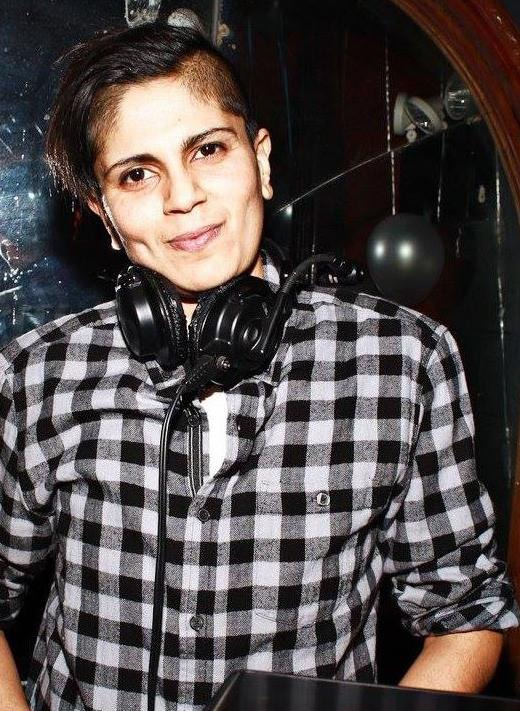
A fierce feminist, gifted musician and popular DJ, this India-born triple-threat is at home on a lit dancefloor, alone in a quiet studio, or performing for a White House gala event. With lots of exciting gigs and projects coming up, now is the time to spice up your life with DJ Tikka Masala!
Thotyssey: Hi Tikka! So, the damn Grammys are coming up this weekend already... any hopes or predictions?
DJ Tikka Masala: “Lemonade” feels like it's going to win--because Beyonce doesn't know it, but she's the queen of the dyke bar.
Ha! I'm sure she knows it. Is Beyonce your biggest request in the booth these days?
It changes week to week, but Beyonce has saved my life many times when the dance floor seemed to be getting bored of me. Beyonce, Rihanna, Nicki, Prince and dancehall classics. Also, Michael Jackson is a unifying force.
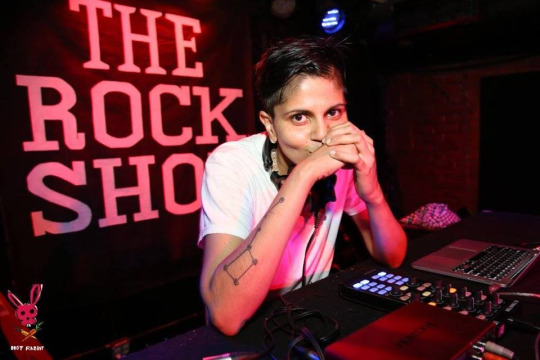
That he is! So, we can get back to music in a bit, but first thing's first: where's your hometown?
I was born in Kolkata India, but I grew up in Franklin Township and in Princeton, NJ.
Wow, you've been around. What was the first music you grew up loving?
I grew up studying Indian classical vocal music. My family in India is a music family--they build harmoniums.
Then in my early teens, I picked up violin and guitar. My parents had a lot of old Bollywood around, and were really strict about the music I was allowed to listen to before my teen years. Lots of Indian music, mostly stuff before the 80's.
I wasn't allowed to watch MTV or listen to pop music; they thought all that was garbage, and would get in the way of serious musical study. And now I'm a DJ [laughs]! Classic. But I also work as a composer, so it's all there.
Best of both worlds!
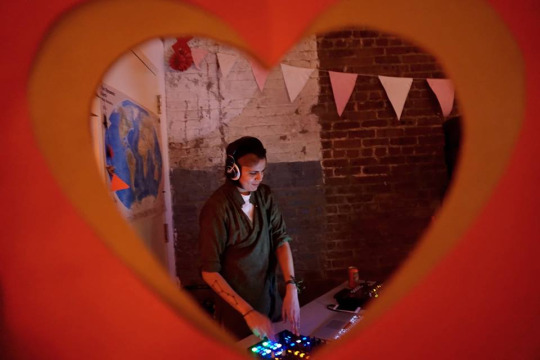
How did you eventually discover pop music?
Well, when my folks moved to Princeton, we landed in a town with arguably the best record store in the country. I had a mixtape penpal relationship with a friend from camp who I was head over heels in love with. That made me fix the parents' old record player and just start exploring cheap (and amazing) albums from all eras--for the purpose of making really good tapes for my friend, out of songs she'd definitely never heard, or just picking songs everyone seems to know but doesn't remember the artist. I don't know how to explain the methodology there, the but the tapes had stories weaving through thematically for sure.
That went on for 2-3 years, I think. I became a good selector. We're still tight.
Oh lord, kiddies these days will never know the power of the thematic mix tape! When did you start DJing?
2004, after moving here from the Bay Area, where I met an awesome global music producer and DJ named Cheb I Sabbah. I came here for grad school, but if I had chosen to stay out there I would have been working with him. [From my blog, here is] a letter to my [late] mentor.
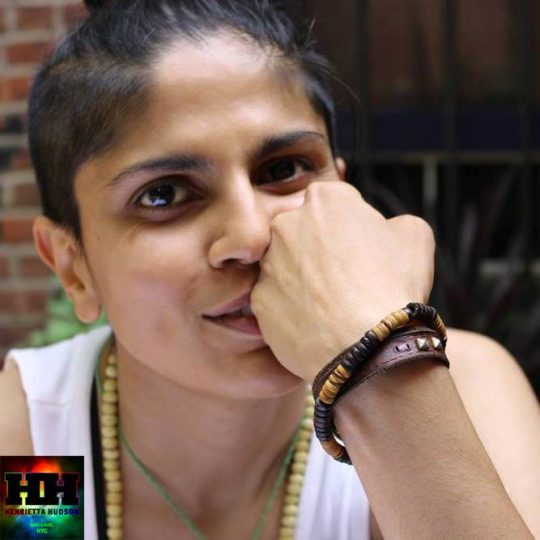
That's very beautiful! It sounds like he put you on a very important path. When you’re spinning at clubs, can you easily move between Western pop and Indian/Eastern genres, or when you go one way is hard to get back to the other?
I always have both things going on at the same time inside of me, even though I'm making choices about what the people in front of me want to hear. I do this for 18-30 hours a week, so I understand well how to balance my needs with what keeps a room together.
I do throwbacks and Top 40 for Henrietta Hudson, where I mostly work, so I'm current with new stuff and also grounded in vintage.
People also hire me specifically for Bollywood, sometimes. There's a party called Sholay that I work for sometimes, that’s strictly South Asian music.
Also, I got to DJ the White House because of the Bollywood. They called me in 2010 to DJ their Diwali party, which was a trip. The Obama administration was special. Trump wouldn't even know what Diwali was.
Amazing! God, how much do you miss Obama and Biden?
A lot. They changed the cultural landscape of this country. After 9-11, America really needed them.
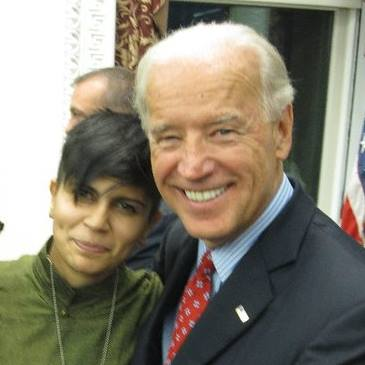
Do you have any hope that we're gonna get through these next four years with anything good intact?
I think this change is begging people to care in active ways that can feel inspiring at times. I am concerned for the well-being of everyone this administration deems to be unworthy, though: elders, disabled folks, immigrant folks, people of color, queers, women, children and poor folks. Artists, too. I'm worried for a lot of the people who keep showing up for me on the dancefloor, for sure.
It's definitely a time that calls for strength in all of us. I notice that you are very observant of people on your floors, and you seem to regard them with a lot of love. Is DJing a way of connecting to people for you?
Oh, definitely. I love being in a room full of people enjoying something together. it's unifying and inspiring to find common ground in music. It's very easy to feel inspired by the results when I'm doing my job well.
When did you first start DJing in queer spaces?
My first gigs in New York were in queer spaces; I started off working for the burlesque and circus communities. First residency was Murray Hill's Amateur Burlesque night at Galapagos Art Space when it was in Williamsburg.
Eventually, I started my own queer dance party called That's My Jam. Now I'm a resident DJ at Henrietta Hudson, the last dyke bar in Manhattan. I've worked in queer space all along.
youtube
Lots of people have different opinions about this, but what's your view regarding why there aren't more lesbian bars in the city now?
I never went into a lesbian bar (in New York) before working for Hens for a private event. I think queer space is decentralized now, because of social acceptance and online dating--and a lot of bars were capitalizing on a niche audience for a long time there. It happens with South Asian community parties with no competition, too.
I think what's amazing about dyke bars, though--more important than being about queerness right now--is that they are women-ran spaces, where lots of women get paid to work on a team together. Every penny that gets spent at a dyke bar is supporting other women's lives. That's not something people necessarily think about when they are figuring out what to do with their friends on a given night. Most queer events aimed at women don't take economics of labor into account, and the bottom line is that, when you fill a space with queers, the people making the most money at the end of the night are not usually queers or women for that matter.
I've stuck to working for women-owned nightlife entities for a long while now, preceding working at the dyke bar. I think it's important to pay women, and pay attention to what your crowd is actually supporting.
That's a very good point, and one that's often forgotten.
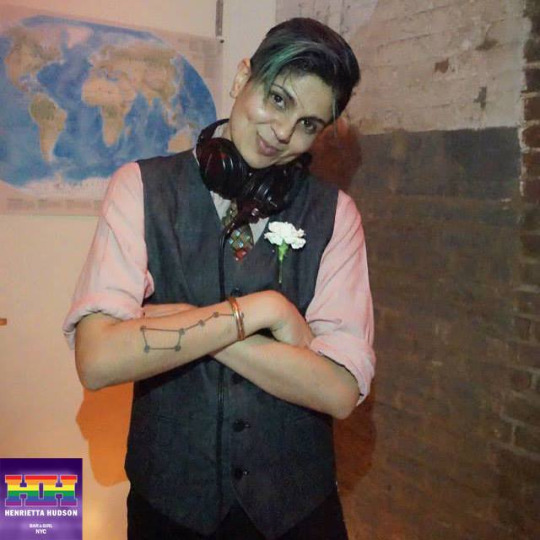
So speaking of Henrietta, you spin the "Homotown" party there on Thursday nights. How would you describe that night to the uninitiated?
It feels like a family. There's music for many generations there. You'll see long-time regulars, tourists, people celebrating anniversaries and birthdays. There are singles who are looking for love, couples coming in on dates, people needing a place to land after a rough week, and, really, folks from all over the world and many different economic situations showing up.
The musical selection is inspired by what I imagine, in three-four decades of local popular taste, the five boroughs sounds like. Since it's a Thursday night, we know it's a consistently populist and local audience.
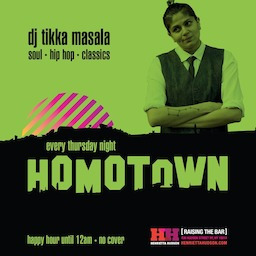
A newer party you're spinning Wednesday nights is down at Friends & Lovers in Brooklyn, “Cheers Queers.” You focus on dancehall, reggae and R&B there. What kind of audiences are coming to this night?
This night is actually a super-quiet thing right now. The bar is owned by a woman--it's in my neighborhood. That event is about to make a transition to being a monthly Saturday early party. So, early in March the schedule is going to change with that one, stay tuned.
It's R&B, Dancehall, and just really good songs from all over the world. That bar is allergic to Top 40, and it works well for Brooklyn. I love it there, and my favorite bartender and dear friend Justen Jilsson works with me, which is always a very special nightlife dynamic: When the DJ and the bartender really love and understand each other, the tone of the whole room shifts.
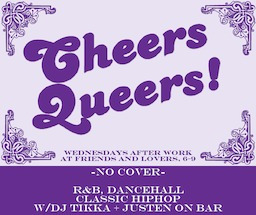
And on Saturday, February 11th, you're spinning Horrorchata's Be Cute party at Littlefield! How often do you get to interact with the Brooklyn nightlifers?
A lot. The drag queen community and I have always had a lovely relationship. I support their work so hard. I see them doing their femme labor, and creating these magical spaces that defy the negativity of the society that surrounds them, and I really feel blessed to be a dyke and a feminist who fits in perfectly with all these brave queens. They are feminists too, also fighting hard to be seen and heard in a society that doesn't always respect or value their work enough.
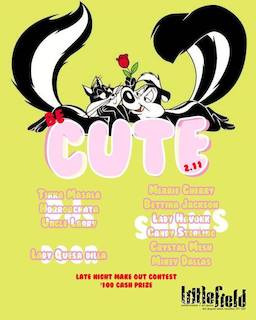
Cheers to queens and all feminists in 2017! So, tell me about your compositions... what sort of music are you creating?
Well, I've been working as a composer for LAVA dance company, which is a feminist geology-based acrobatic/modern/circus/hybrid space. Sara East Johnson, the director there, pulled me in a few years ago when their company members started showing up at my parties and getting their lives. A lot of professional dancers have always showed up for me, but this group pulled me in and just invited me to make compositions for them, and over the years it's accumulated to multiple scores.
It's electronic music, samples, instrumental compositions, and really specific assignments tied to choreography concepts. I love them so much, I literally moved to the same street as them a few years ago. It's a community that understands me, and vice versa. We have a 15-year retrospective show in early June, right around my birthday. It's very exciting.
They are the strongest women I've ever met. We're like Frida and Diego now: same street, different houses.
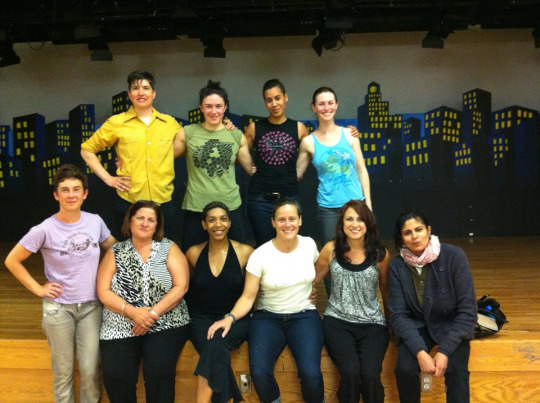
Is it a challenge at all to balance original composition with DJ gigs?
They are two completely different worlds. One is very solitary, the other is very social. The balance is actually really good for me, because I'm definitely a creative person that needs to generate work to feel good about my life.
I love sitting in a room alone full of instruments, just as much as I love being in a packed club full of women getting their lives together. It's all symphonic in it's own way; I always feel like a conductor or medium.
The past year, I've also been keeping track of all the posts from the DJ booth at [my blog] The Dyke Bar, so there's a running log of all the stories I've seen there. I'm sure that's going to start feeding in, too. Folks have asked me to publish, but there's something else I have in mind. My background is in cinema studies and ethnographic filmmaking: Tisch brought me to New York for grad school, so I'm seeing a lot of cycle-completing.
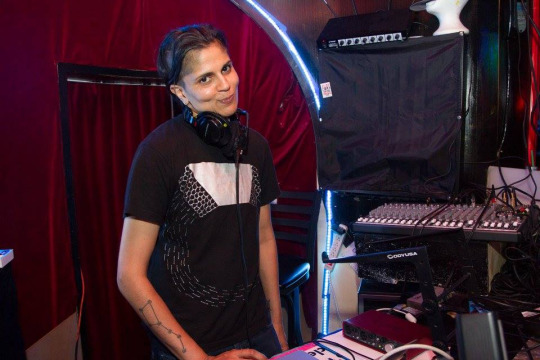
Do you have a favorite DJing story so far?
[This one.] It's about women. Also, the night after Trump got elected, a high speed motorcyclist and I got to know each other. There are so many good stories, it's hard to pick.
And I’m sure there will be many more to come! So, what else is on the horizon?
Well, LAVA is having their 15-year retrospective in June, and I'm a part of that. Setting up a new monthly at Friends and Lovers, that's a thing. And an art show in Spring, venue TBA, but in collaboration with a group called AOT Projects Salon, with a paper version of the stories from the Dyke Bar I've been collecting, and audio connected to the writing.
Sounds like a very busy and creative time for you! Okay, in closing: what is one thing that people might not get about being a DJ, but should?
Many of us are actually introverts/shy, and not the party animals you might assume. A lot of the DJs I know, who are actually good at what they do, are also some of the best listeners/therapists. I mean, I actively listen for six hours at a time when I'm DJ-ing.
The doctor is in! Thank you Tikka, for all that you do!
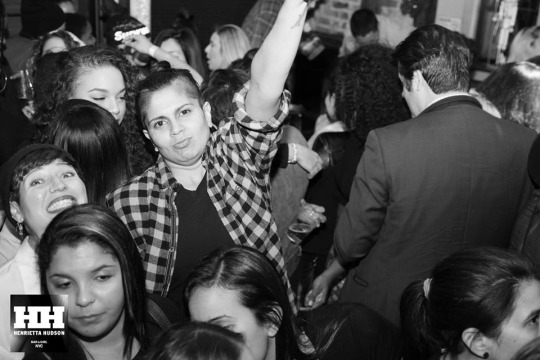
DJ Tikka Masala spins the “Homotown” party at Henrietta Hudson Thursday nights (10pm). She also spins “Cheers Queers” at Friends & Lovers, which is currently weekly Wednesdays (6pm), but should convert to monthly Saturdays in March (TBA). Click here for a full list of upcoming appearances. Follow Tikka on Facebook, Instagram, Twitter, Tumblr and Soundcloud.
On Point Archives
0 notes